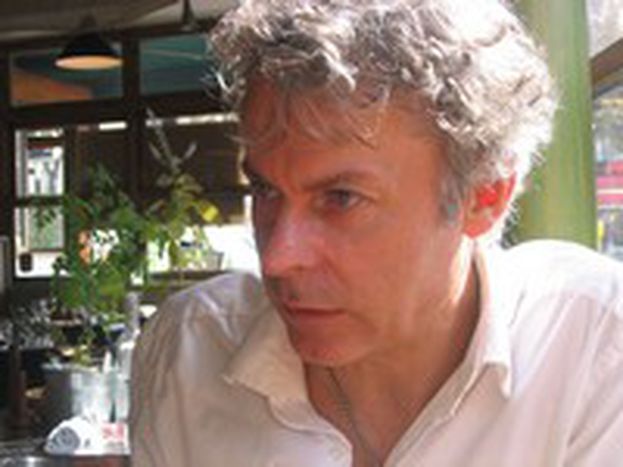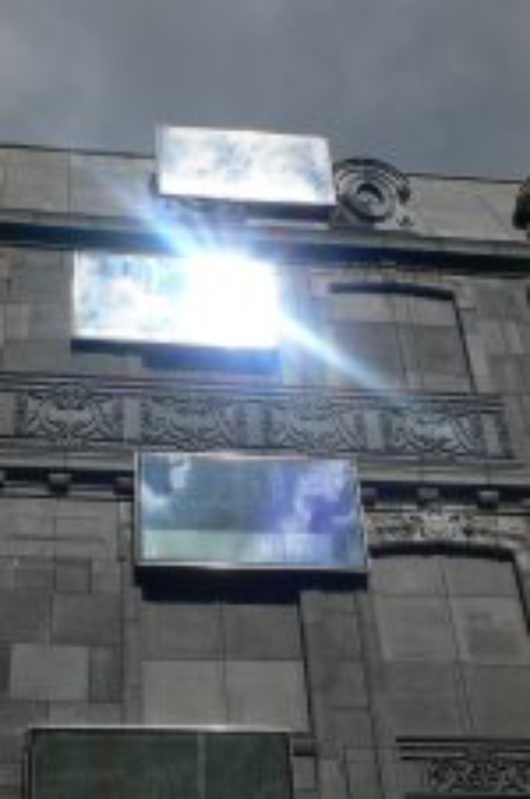
Edouard François: urban chameleon
Published on
Translation by:
 ed swan
ed swan
The Parisian architect mixes architecture with ecology: a fashionable fifty-year-old with a diverse background and designer of the offbeat Tower Flower in Paris
Edouard François's studio is not far from the Montparnasse tower. In a residential district on the ground floor of a cement apartment building, the architect has made himself at home. His ceiling reveals open pipes and electric wiring, and there are neon lights and stacks of plastic all over the place.
Edouard François has just turned fifty, and remains impeccably stylish. Well groomed, with one too many buttons on his shirt undone, he speaks in a firm tone. 'I'm Parisian, from a French aristocratic family,' he says, as if to confirm his studies: town planning at the prestigious École Nationale des Ponts et Chaussées (ENPC, 'National school of Bridges and Roads'), and architecture and engineering at the Ecole Nationale Supérieure des Beaux-Arts, Paris (Academy of Fine Arts).
Three elements of architecture
It's natural to wonder what it means for such a multifaceted person to be an architect. 'Mine,' explains the architect over a glass of red wine, 'is a profession of applied arts, a crossroads of three elements. On the one hand it's necessary to keep a technical dimension, an economic and legal know-how. Then it's necessary to have a general awareness, to ask yourself questions like 'what makes the world move today?'. Finally, to develop a human observation.'
Edouard François emphasises the meaning of architecture by analysing it in a way that is both elementary and profound. 'Man can live solely within architecture. He needs a complex building which must be decorated. Only in this way can he be happy.' Indeed, in François' view, working with nature offers a welcome complexity: 'Watch a tree. It has a thousand branches, it moves, grows, changes colour!' François uses nature to make his designs more complex. His 2000 Chateau de Lez creation in Montpellier has been branded the 'building that grows', comprising seven staircases equipped with vegetal walls, with a system of automatic irrigation. He is also famed for the Tower Flower building in Paris, which is decorated with bamboos and other plants.
Misunderstanding ecology
The name of the Parisian architect is inextricably linked with the idea of nature and ecology, but this relationship has long been misinterpreted. 'Ecology is an element which plays a role within the dialogue of modern awareness: the world is no longer interested in hygiene or globalisation. Contemporary society has turned to subject, to context, to emotions.' François likes to design buildings which work as part of the context around them, 'like a chameleon, with great respect for the urban landscape.' And, he underlines with great emphasis, that 'they mustn't create new scars - there are already too many!
 The latest project undertaken in the studio is an example of his vision of ecology. The hotel Fouquet's Barrière is on the Champs Elysées. 'When I was commissioned to design Fouquet's, I was asked to design the building 'ecologically'. but it made no sense! On the Champs Elysées it wouldn't work: there's no nature! And I don't want to make a building just so that somebody will walk past and say 'wow, an ecological building!' I want to demonstrate intelligent architecture.' Indeed, Fouquet's remains a spectacular example of architecture in harmony with its context, a 'silent and free' building.
The latest project undertaken in the studio is an example of his vision of ecology. The hotel Fouquet's Barrière is on the Champs Elysées. 'When I was commissioned to design Fouquet's, I was asked to design the building 'ecologically'. but it made no sense! On the Champs Elysées it wouldn't work: there's no nature! And I don't want to make a building just so that somebody will walk past and say 'wow, an ecological building!' I want to demonstrate intelligent architecture.' Indeed, Fouquet's remains a spectacular example of architecture in harmony with its context, a 'silent and free' building.
Static France, sophisticated Italy
'I'm interested in using techniques, features and materials which are zeitgeist, in the spirit of our time!' Edouard François lives and develops the trends of contemporary society in order to respond to a need for artistic concern, for personal sensitivity. Despite numerous travels, conferences all over the world and a chair at London's Architectural Association School of Architecture, the architect remains in Paris, for how much longer
though?
'France is static; I'm no longer at home here. I would like to move.' He's attracted by the dynamism of cities such as Antwerp, Brussels and London. On the other hand, he finds Italy 'extremely sophisticated', too much so. He asks: 'Is there really any need to be so refined?' Pouring himself the umpteenth glass he admits: 'I love moving about and travelling. Some weekends I take off, I take a plane to Martinique, I go into the rainforest and my colleagues don't even know.' At the moment, leaving France is a realistic objective: 'I've got work and building sites all over the
world! Clients contact me by internet and I'm waiting to have less that 40% of my work in France before I leave.' Then he adds smilingly: 'I've already asked my Swiss partner to marry me, I want to change my nationality!'
'Inspiration? We live in a nightmare of information! You need to search through all the shit that's around us in our society to find the inspiration for a good job! There's no need to go off to who knows where to find good ideas.' But it's clear that Edouard François' principal role is that of 'seducer', and the main objective of his work is to win over the public with his art. He looks me straight in the eyes and says laughingly, 'even the young man who's walking with his girlfriend has to stop on the Champs Elysées, he has to take his eyes off her and look at my building. Then I feel like I've won!' Thus saying he finishes the last drop of wine and, taking his leave, goes back into the studio.
Translated from Edouard François: «Costruisco per sedurre»


